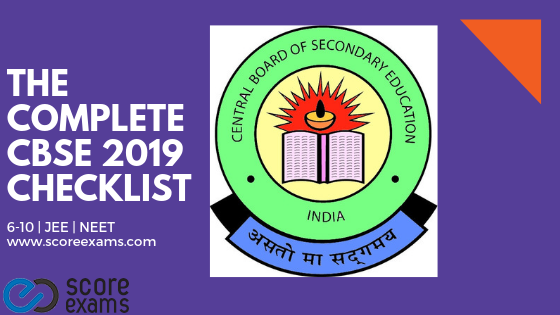
Complete CBSE 2019 Checklist
The CBSE board exams are due to begin soon. The class 12 board exams will begin on February 15 with Vocational Subjects and conclude on April 4, 2019 while the class 10 board examination will begin on February 21 and end on March 29, 2019. Every student needs to keep the following practices in mind to excel in the exams-
- Basics- The main ingredients for writing a perfect answer are knowledge and practice. Students should make sure that they have revised every topic as per the syllabus given in NCERT textbooks.
- NCERT Questions- While preparing for board exams, students tend to go through various supplementary books and often end up ignoring their NCERT text books. Students should not ignore the questions given in the NCERT textbooks and keep them on their priority list while revising for the exam.
- Sample Question Paper and Marking Scheme- Students should go through the sample papers and marking scheme released by CBSE. Going through the sample question paper and accompanying marking scheme will help students understand the type of questions and how they need to be answered based on the marks allotted to them.
- Ensure that there is no discrepancy in your ?personal details like name, roll number, photograph, signature, parent/guardian?s name, school name, school authority?s signature and stamp.
- Cross-check the exam date, timings, subjects and their codes.
On the day of the exam-
- Be at your allotted center at least one hour before the commencement of the exam.
- Make sure you are in proper uniform and carrying your admit card along with all other examination essentials like pens, pencils, erasers, ruler, etc.
- Do not carry things that are banned in the exam hall and are considered as cheating material such as study notes, paper chits, watches, calculators, mobile phones etc.
- Use the additional 15 minutes provided to you to read and cross-verify the test paper.
- Read the question paper carefully with full concentration.
- Attempt the question paper in serial order.
- First, attempt the questions which you are sure about.
- Adhere to the prescribed word limit in English papers.
- Use a black pen to write important keywords. Underline important points.
- Write the answer in the corresponding tense form of the question.
- Present your answers well. They should be neat, fluent and to the point.
- Mention the number of 'steps' while solving your question as there is a criterion of step marking.
- Use pencil and scale to draw diagrams. Never use a pen for diagrams.
- Making margins on the answer booklet is a good practice and makes your answers look presentable.
- If your handwriting is poor, write in a bigger font leaving some space in between the words.
All the Best!
Learning Efficiently.
Previous PostNEET 2019 - Exam Date, Details & Syllabus
Next Post





